被动语态的翻译
什么是被动语态
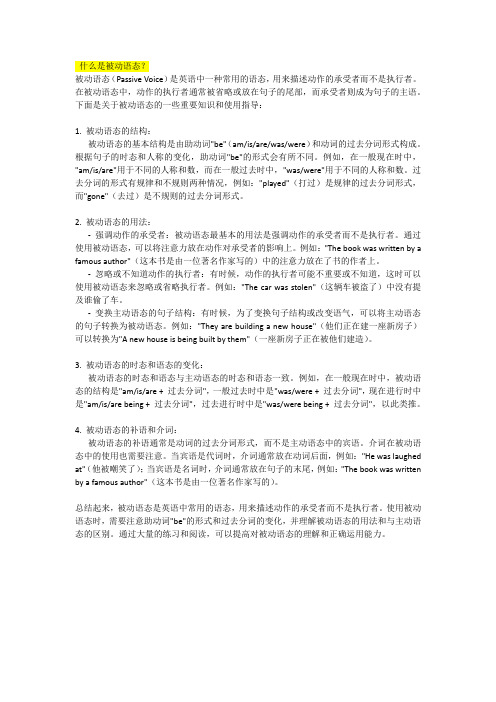
什么是被动语态?被动语态(Passive Voice)是英语中一种常用的语态,用来描述动作的承受者而不是执行者。
在被动语态中,动作的执行者通常被省略或放在句子的尾部,而承受者则成为句子的主语。
下面是关于被动语态的一些重要知识和使用指导:1. 被动语态的结构:被动语态的基本结构是由助动词"be"(am/is/are/was/were)和动词的过去分词形式构成。
根据句子的时态和人称的变化,助动词"be"的形式会有所不同。
例如,在一般现在时中,"am/is/are"用于不同的人称和数,而在一般过去时中,"was/were"用于不同的人称和数。
过去分词的形式有规律和不规则两种情况,例如:"played"(打过)是规律的过去分词形式,而"gone"(去过)是不规则的过去分词形式。
2. 被动语态的用法:-强调动作的承受者:被动语态最基本的用法是强调动作的承受者而不是执行者。
通过使用被动语态,可以将注意力放在动作对承受者的影响上。
例如:"The book was written by a famous author"(这本书是由一位著名作家写的)中的注意力放在了书的作者上。
-忽略或不知道动作的执行者:有时候,动作的执行者可能不重要或不知道,这时可以使用被动语态来忽略或省略执行者。
例如:"The car was stolen"(这辆车被盗了)中没有提及谁偷了车。
-变换主动语态的句子结构:有时候,为了变换句子结构或改变语气,可以将主动语态的句子转换为被动语态。
例如:"They are building a new house"(他们正在建一座新房子)可以转换为"A new house is being built by them"(一座新房子正在被他们建造)。
被动语态的翻译
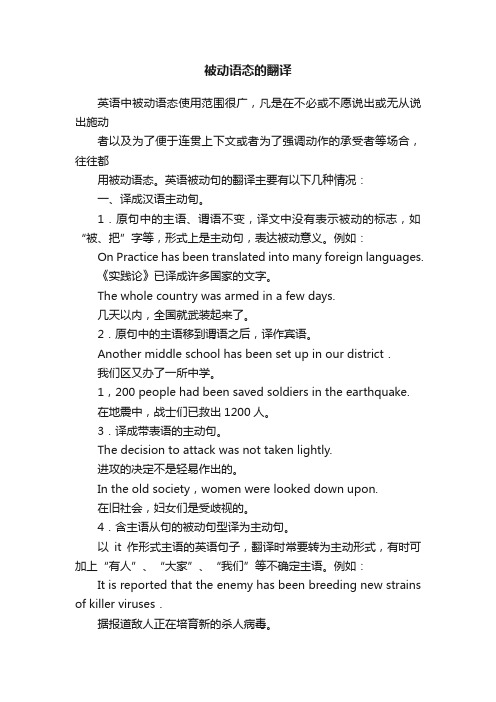
被动语态的翻译英语中被动语态使用范围很广,凡是在不必或不愿说出或无从说出施动者以及为了便于连贯上下文或者为了强调动作的承受者等场合,往往都用被动语态。
英语被动句的翻译主要有以下几种情况:一、译成汉语主动旬。
1.原句中的主语、谓语不变,译文中没有表示被动的标志,如“被、把”字等,形式上是主动句,表达被动意义。
例如:On Practice has been translated into many foreign languages.《实践论》已译成许多国家的文字。
The whole country was armed in a few days.几天以内,全国就武装起来了。
2.原句中的主语移到谓语之后,译作宾语。
Another middle school has been set up in our district.我们区又办了一所中学。
1,200 people had been saved soldiers in the earthquake.在地震中,战士们已救出1200人。
3.译成带表语的主动句。
The decision to attack was not taken lightly.进攻的决定不是轻易作出的。
In the old society,women were looked down upon.在旧社会,妇女们是受歧视的。
4.含主语从句的被动句型译为主动句。
以it作形式主语的英语句子,翻译时常要转为主动形式,有时可加上“有人”、“大家”、“我们”等不确定主语。
例如:It is reported that the enemy has been breeding new strains of killer viruses.据报道敌人正在培育新的杀人病毒。
It is suggested that meeting be put off tillnext Monday。
有人建议会议推迟到下星期一举行。
英语被动语态的翻译举例
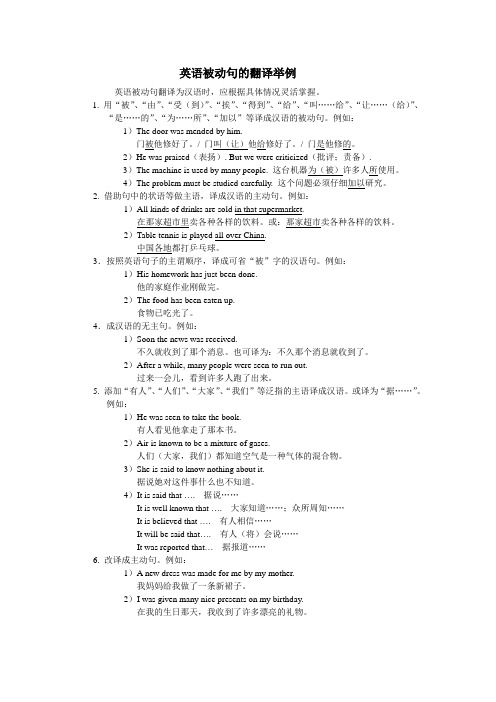
英语被动句的翻译举例英语被动句翻译为汉语时,应根据具体情况灵活掌握。
1. 用“被”、“由”、“受(到)”、“挨”、“得到”、“给”、“叫……给”、“让……(给)”、“是……的”、“为……所”、“加以”等译成汉语的被动句。
例如:1)The door was mended by him.门被他修好了。
/ 门叫(让)他给修好了。
/ 门是他修的。
2)He was praised(表扬). But we were criticized(批评;责备).3)The machine is used by many people. 这台机器为(被)许多人所使用。
4)The problem must be studied carefully. 这个问题必须仔细加以研究。
2. 借助句中的状语等做主语,译成汉语的主动句。
例如:1)All kinds of drinks are sold in that supermarket.在那家超市里卖各种各样的饮料。
或:那家超市卖各种各样的饮料。
2)Table tennis is played all over China.中国各地都打乒乓球。
3.按照英语句子的主谓顺序,译成可省“被”字的汉语句。
例如:1)His homework has just been done.他的家庭作业刚做完。
2)The food has been eaten up.食物已吃光了。
4.成汉语的无主句。
例如:1)Soon the news was received.不久就收到了那个消息。
也可译为:不久那个消息就收到了。
2)After a while, many people were seen to run out.过来一会儿,看到许多人跑了出来。
5. 添加“有人”、“人们”、“大家”、“我们”等泛指的主语译成汉语。
或译为“据……”。
例如:1)He was seen to take the book.有人看见他拿走了那本书。
什么是被动语态
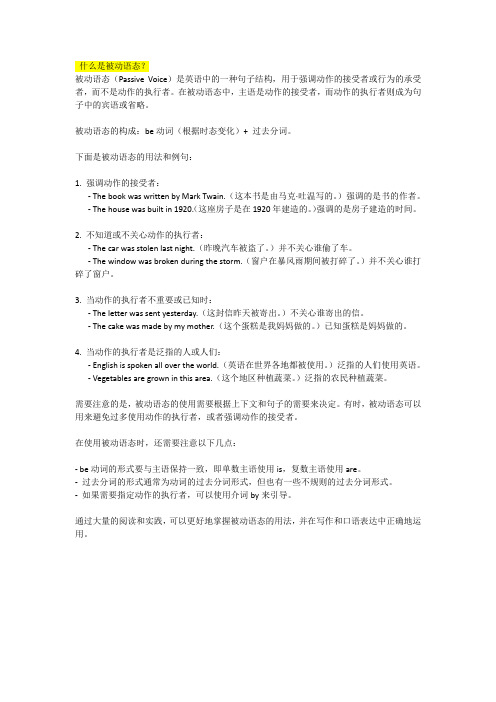
什么是被动语态?被动语态(Passive Voice)是英语中的一种句子结构,用于强调动作的接受者或行为的承受者,而不是动作的执行者。
在被动语态中,主语是动作的接受者,而动作的执行者则成为句子中的宾语或省略。
被动语态的构成:be动词(根据时态变化)+ 过去分词。
下面是被动语态的用法和例句:1. 强调动作的接受者:- The book was written by Mark Twain.(这本书是由马克·吐温写的。
)强调的是书的作者。
- The house was built in 1920.(这座房子是在1920年建造的。
)强调的是房子建造的时间。
2. 不知道或不关心动作的执行者:- The car was stolen last night.(昨晚汽车被盗了。
)并不关心谁偷了车。
- The window was broken during the storm.(窗户在暴风雨期间被打碎了。
)并不关心谁打碎了窗户。
3. 当动作的执行者不重要或已知时:- The letter was sent yesterday.(这封信昨天被寄出。
)不关心谁寄出的信。
- The cake was made by my mother.(这个蛋糕是我妈妈做的。
)已知蛋糕是妈妈做的。
4. 当动作的执行者是泛指的人或人们:- English is spoken all over the world.(英语在世界各地都被使用。
)泛指的人们使用英语。
- Vegetables are grown in this area.(这个地区种植蔬菜。
)泛指的农民种植蔬菜。
需要注意的是,被动语态的使用需要根据上下文和句子的需要来决定。
有时,被动语态可以用来避免过多使用动作的执行者,或者强调动作的接受者。
在使用被动语态时,还需要注意以下几点:- be动词的形式要与主语保持一致,即单数主语使用is,复数主语使用are。
-过去分词的形式通常为动词的过去分词形式,但也有一些不规则的过去分词形式。
被动语态的翻译
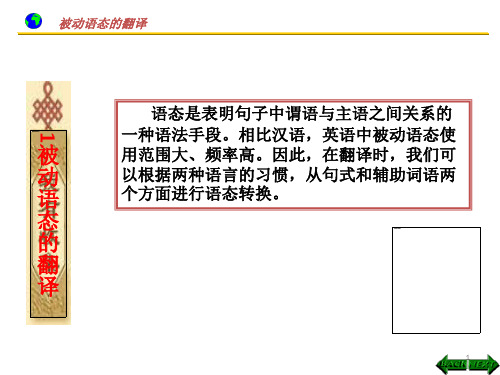
被动语态的翻译
[<]
英语中以it 做形式主语,以被动语态作谓语,其后跟一个由that引导的主语从句的结构很多。这种结 构在译成汉语时,除把it一律省略外,通常有两种处理方法: 1.在被动语态前加“人们”、“有人”、“我们”、“大家”等词 2.用“据……”等短语译出
2). It is estimated that Americans spend up to five years of their lives in that tedious, stressful but unavoidable process known as waiting. 据估计,美国人一生中, 在乏味而令人厌烦, 却又躲避 不掉的等待上所耗费的时间,竟达五年之多。 英语中这种it做形式主语的被动句型在各类文章中比 比皆是,汉译时一般均按主动结构译出。即将原文中 的主语从句译在宾语的位置上,而把it做形式主语的主 句译成一个独立语或分句。常见的固定结构如:
4) The monkeys were given sweet potatoes by scientists who wanted to attract them to the shore of an island.
科学家们给猴子白薯,想把它们引到海岛的岸边。
10
被动语态的翻译
[<]
B . 把被动语态译成汉语主动句 1). His pride must be pinched. 他这股傲气应该打下去。
17
被动语态的翻译
1.4 “It+ be+ past participle + that引导的从句”句型的翻译 A. 不加主语 It is hoped that... 希望…… It is reported that … 据报道…… It is said that... 据说…… It is supposed that… 据推测…… It may be said without fear of exaggeration that… 可以 毫不夸张地说…… It must be admitted that... 必须承认…… It must be pointed out that... 必须指出…… It will be seen from this that… 由此可见……
被动语态翻译

被动语态翻译被动语态是英语语法中常用的一种语态。
在被动句中,动作的承受者(即主动句中的宾语)成为句子的主语,而动作的执行者(即主动句中的主语)则成为被动句中的介词短语(通常由介词“by”引导)或省略掉。
被动语态常用于强调动作的接收者或者操纵者的不重要性。
下面是一个关于被动语态的例子:主动语态:John wrote the article.翻译:约翰写了这篇文章。
被动语态:The article was written by John.翻译:这篇文章是约翰写的。
被动语态在以下情况下常常被使用:1. 当动作的执行者不明确或不重要时。
例如:The car was repaired.(这辆车已经修好了。
)2. 当我们想强调动作的承受者或结果时。
例如:The book was written by a famous author.(这本书是由一位著名作家写的。
)3. 当我们想避免重复使用主动句中的主语时。
例如:The tickets were sold out quickly.(这些票很快就卖光了。
)4. 在科学或者学术写作中,常使用被动语态来描述实验或研究结果。
例如:The data was collected and analyzed.(数据已被收集和分析。
)被动语态的构成:被动语态的构成方式为:be动词(am, is, are, was, were, been, being) + 过去分词(V-ed)。
例如:主动语态:She opens the door.被动语态:The door is opened by her.被动语态也可以用于不同时态和不同人称,只需要根据上述构成方式进行相应的变化。
例如:主动语态:They will finish the project.被动语态:The project will be finished by them.被动语态的使用需要根据上下文和语境来决定,不适合所有情况。
被动语态的翻译

eg: Our foreign policy is supported by the people all over the world.
我们的对外政策受到全世界人民的支持。
英语中被动语态使用范围很广,凡是不必说出主动者、不愿说出主动者、无从说出主动者或者是为了便于连贯上下文等场合,往往都用被动语态。汉语中虽然也用被动语态,但使用范围要狭窄得多。英语被动语态的句子,译成汉语时,很多情况下都可译成主动句,但也有些可以保持被动语态。
I: 译成汉语主动句
1、原文中的主语在译文中作宾语
eg: By the end of the war 800 people had been saved by the
organization.
战争结束时,这个组织拯救了800人。
2、原文中的主语在译文中仍作主语
eg: On their domestic stations events in the Middle East were
dismissed briefly.
在他们国内电台的广播中,中东事件只轻描淡写地报导了一下。
3、译成带表语的主动句
eg: The crew were trained at Eglin Field, Florida.
机组人员是在佛罗里达州埃格林空军基地训练的。
eg: People were chased off the streets by an eight o’clock curfew.
八点钟的宵禁把人们从街道赶走。
eg: The famous hotel had been practically destroyed by the big fire.
【英语翻译】被动语态的翻译方法

a
1
一般被动语态有四种情况:
• 第一,无从说出、无需提及主动者 • When will the new bridge be built? • 什么时候建新桥? • 第二,出于某种考虑,无意说出主动者 • Generally it is considered not polite to
英文原句中没有提到施动者时,有时可将被动句译成无主 句。
• The unpleasant noise must be immediately put an
end to.
• 必须立即中止这种讨厌的噪声。
• Very often, introductions are made using both
first and last name.
very important for Chinese students.
•人们认为英语对中国学生来
说是很重要的。
•I am afraid I shall be
laughed at.
•
我怕大家笑话我。 a
7
(3)把原文句中的一部分转译成主 语
• 英语中一些被动句译成中文时,需要将句子中某
个适当的成分转译成主语。既要做到不违背英文 原文,又符合中文规范。表示方位的地点状语转 译成主语的情况较多
speeding truck.
• 那个老人让一辆超速的卡车撞倒了。 • Those books have been affected with
damp.
• 那些书受潮了。
a
18
在现代汉语中有些主动表达句式同 样具有被动意义
• 问题应及时加以解决。
• Problems should be resolved in good time
- 1、下载文档前请自行甄别文档内容的完整性,平台不提供额外的编辑、内容补充、找答案等附加服务。
- 2、"仅部分预览"的文档,不可在线预览部分如存在完整性等问题,可反馈申请退款(可完整预览的文档不适用该条件!)。
- 3、如文档侵犯您的权益,请联系客服反馈,我们会尽快为您处理(人工客服工作时间:9:00-18:30)。
4.翻译成汉语的无主句
Great efforts should be made to inform young people
especially the dreadful consequences of taking up the habit of smoking. 应该尽最大努力告诫年轻人吸烟的危害, 特别是 吸上瘾后的可怕后果
3
When the crude oil is obtained from the field, it is taken to the refineries to be treated. The commonest form of treatment is heating. When the oil is heated, the first vapors to rise are cooled and become the finest petrol. Petrol has a low boiling point; if a little is poured into the hand, it soon vaporizes. Gas that comes off the oil later is condensed into paraffin. Last of all the lubricating oils of various grades are produced. What remains is heavy oil that is used as fuel.
被动语态的翻译
——翻译的基础知识与技巧(三)
1
教学内容
1、英语中常用被动语态的情况 2、汉语中被动意义的表现方式 3、英语被动语态的翻译
2
When the crude oil is obtained from the field, it is taken to the refineries to be treated. The commonest form of treatment is heating. When the oil is heated, the first vapors to rise are cooled and become the finest petrol. Petrol has a low boiling point; if a little is poured into the hand, it soon vaporizes. Gas that comes off the oil later is condensed into paraffin. Last of all the lubricating oils of various grades are produced. What remains is heavy oil that is used as fuel.
6
2、出于礼貌措辞等方面考虑不愿说出动作 的执行者是谁。例如: You are requested to give a performance. It is generally considered not advisable to act that way.
7
3、无从说出施动者是谁。例如: You’re wanted on the phone. The problem is being studied. Rice is chiefly grown in the south.
14
翻译成汉语的主动句 1. “加以”, “经过”, “用……来” ,“可以 用来” Perfumes may be made from the oils of certain flowers. Soaps are made from vegetable and animal oils. 有些花儿产生的油可以用来制造香水。植物 油和动物油还可以用来制作肥皂。 Nuclear power's danger to health, safety, and even life itself can be summed up in one word: radiation. 核能对健康、安全, 甚至对生命本身构成的危险
13
三、翻译方法
翻译成汉语的主动句 1、 “加以”, “经过”, “用……来” 2、增补泛指性的词语(人们,大家等)作主语 3、主语译成宾语 4、翻译成汉语的无主句 5、翻译成带“是……的”的主动句 译成汉语的被动句 1、汉语句中有“被”、“受”、“挨”、“遭 受”等词 2、译成“为……所”的结构 译成“把”、“使”和“由”字句
窗玻璃被这小孩打碎了
23
I was so impressed by these words that I used them later for a Christmas card. 我为这些话所深深感动,后来我就把它们写在 圣诞卡上了。
24
译成“把”、“使”和“由”字句
The famous hotel had been practically destroyed by the big fire. 大火把这家著名的旅馆几乎全部毁坏。 The plan is going to be examined first by the research group。 计划将先由研究小组加以研究。
可能有人会指出, 无线电广播同样也能做到这一点, 但还是电视屏 幕上的节目要生动、真实得多。
17
It is asserted that … 有人主张 …… It is believed that … 有人认为…… It is generally considered that … 大家(一般人) 认为 It is well known that … 大家知道(众所周 知)…… It will be said … 有人会说…… It was told that … 有人曾经说……
8
4、为了便于上下衔接。例如: He appeared on the stage and was warmly applauded by the audience. Jack fought John in the men’s singles last night and was beaten.
9
20
New source of energy must be found, and this will take time….
It is hoped that … 希望…… It is reported that … 据报道…… It is said that … 据说…… It is supposed that … 据推测…… It may be said without fear of exaggeration that … 可以毫不夸张地说…… It must be admitted that … 必须承认…… It must be pointed out that … 必须指出…… It will be seen from this that … 由此可见……
人们普遍认为 孩子们的早年经历在很大程度 上决定了他们的性格及其未来 的人品。
16
It could be argued that the radio performs this service as well, but on television everything is much more living, much more real.
11
4、“是……的” 表示静态的句子 这些 产品是我国制造的。 5、“……的是” 推荐我的是一位教授。 6、“……加以/予以”组成倒置的宾语结 构 这个问题将在下一章加以讨论。
12
◆用词序手段来表现被动意义 1、受事者——动词 困难克服了,工作完成了,问题也解决了。
2、受事着——施事者——动词 我们在这里所讲的话,人们不会长久地记 住。
18
3.主语译成宾语 By the end of the war, 800 people had been saved by the organization, but at a cost of 200 Belgia n and French lives.
大战结束时, 这个组织拯救了八百人, 但那是以 二百多比利时人和法国人的生命为代价的(但 二百多比利时人和法国人却为此付出了生命代价)。
inundate : to cover with water, especially floodwaters (淹没)
26
The English language is being destroyed by a "deadly virus of management speak" which has infected the mouths and minds of politicians like Tony Blair and George W. Bush, a leading UK journalist said recently.
4
一、被动语态在英语中的运用
被动语态的广泛使用是英语区别于汉语的 一大特点。这一特点在科技英语语体中反 映得尤为突出。这不仅是因为被动结构比 主动结构更少主观色彩,结构更简单,还 因为有不必、不愿或无从说出施动者等情 况的存在。
5
1、不知道或没有必要说明动作的执行者是 谁。例如: Such books are written for children. We haven’t been told about it. The English evening has been put off till Saturday.
5、为了突出谈话的中心。例如: The song was composed by a French musician. The program was designed by ourselves.ຫໍສະໝຸດ 10二、汉语被动意义的表达方式
